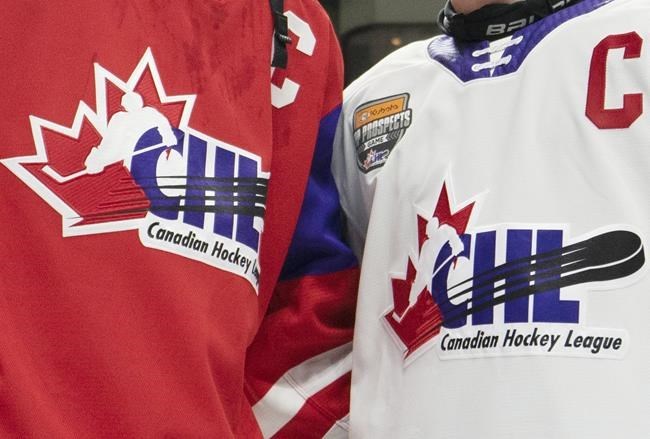
Canadian Hockey League logos are shown following the CHL Top Prospects Game in Hamilton, Ont. on January 16, 2020. THE CANADIAN PRESS/Peter Power
Republished February 17, 2023 - 12:02 PM
Original Publication Date February 17, 2023 - 8:46 AM
TORONTO - The lawyer representing the plaintiffs in a lawsuit against the Canadian Hockey League, the country's three major junior circuits and its teams related to disturbing allegations of sexual assault and torture suffered by teenage players says his clients are considering "various options" after a class-action request was denied.
In a decision earlier this month, an Ontario Superior Court judge described the "horrific and despicable and unquestionably criminal actions" the former players suffered at the hands of teammates and staff during initiations.
But while Justice Paul Perell accepted the evidence, he turned down a request to certify a class-action lawsuit against the leagues and their clubs.
The plaintiffs, including former NHL player Daniel Carcillo, can still appeal the decision or launch individual lawsuits against the leagues and teams.
Lawyer James Sayce told The Canadian Press in an email that regardless of the path forward "the plaintiffs will ensure that a meaningful avenue for access to justice will be created for those who were abused in major junior hockey."
The suit originally filed in 2020 covers events in the Ontario Hockey League, Western Hockey League and Quebec Major Junior Hockey League going back to 1975.
Perell's 103-page ruling quoted from sworn statements by unidentified players describing what they experienced when some were as young as 15.
One player, identified only as FF, said he was sodomized with a hockey stick as part of a rookie initiation — an assault at least one other player said also happened to him.
"I have lived with the abuse I suffered," the player said. "Coming out with my story has been extremely difficult but (I) am telling it because I do not want any other child to go through what I did."
Perell wrote in his Feb. 3 decision the evidence established that players were "tortured, forcibly confined, shaved, stripped, drugged, intoxicated, physically and sexually assaulted; raped, gang raped, forced to physically and sexually assault other teammates."
The judge said they were "compelled to sexually assault and gang rape young women invited to team parties, forced to eat or drink urine, saliva, semen, feces, or other noxious substances."
Perrel added players were also "forced to perform acts of self-injury, forced to perform acts of bestiality."
He accepted the former players' evidence and described the main plaintiffs — Carcillo, Garrett Taylor and Stephen Quirk — as "genuine heroes."
But the judge denied their request to certify a class-action lawsuit after determining they failed to present a workable plan to litigate.
"It is not conceivable that such a plan could be fashioned to deal in one class action with the evil that has persisted for half a century in amateur hockey," Perell wrote.
The judged added in his ruling that "the immediate lawsuit is about egregious harms perpetrated on children and the persons or entities at fault should be punished."
But he added "even children know and in their heart Messrs. Carcillo, Taylor, and Quirk in their noble pursuit of cleaning hockey must know it is wrong and fundamentally unjust to punish teams for something that somebody else did."
Perell said the proposed class-action lawsuit wasn't certifiable because the fundamental premise was the CHL, WHL, OHL, QMHL and 60 member teams "are jointly and severally liable for each other's wrongdoings regardless of whether the particular team participated."
"Moreover, if the premise were correct (but it is not), the proposed class action would fail all the other certification criteria except the identifiable class criterion," the judge wrote.
"An abused hockey player has only individual causes of action against his own team and his own leagues."
This report by The Canadian Press was first published Feb. 17, 2023.
___
Follow @JClipperton_CP on Twitter.
News from © The Canadian Press, 2023